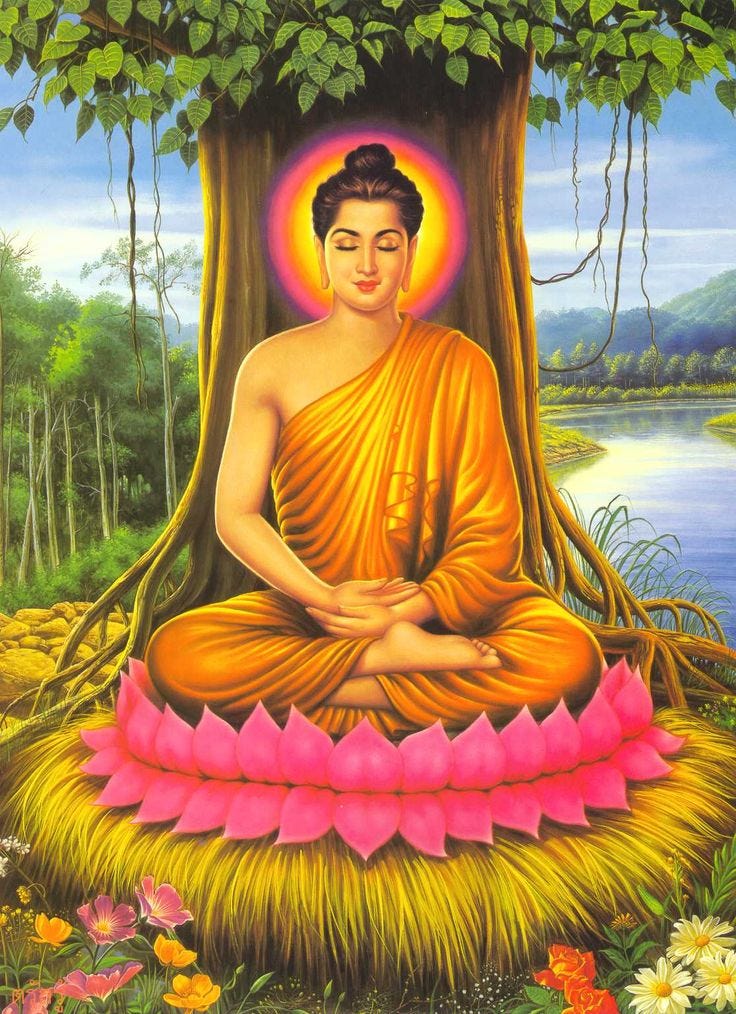A Challenge for Secular Buddhists
The repugnant conclusions of Buddhism under secular assumptions
There seems to be an increasing population of people in the West who take an interest in the teachings of Buddhism, but seek to strip it of its supernatural elements. I will refer to this trend as “Secular Buddhism.” What I seek to show in this article is that the project of secularizing Buddhism leads to several repugnant conclusions, and therefore I seek to critique Secular Buddhism on these grounds.
First, let’s start by going over the core assertions of Buddhism in general, and afterwards see what is stripped away and what is maintained by secularism. Buddhism is founded on the four noble truths: that 1. life is suffering, 2. desire is the cause of suffering, 3. there is a way to cease suffering, and 4. that way is the noble eightfold path. The eightfold path consists of the behavioral precepts that Buddhists are called upon to follow. What is important for our analysis is the desired end state that following this path is meant to lead to: the cessation of suffering. Within this life this is known as nirvana, a state free from the experience of suffering that otherwise defines existence. However, this is just a foretaste of a greater end yet. Here it will be important to mention another core precept of Buddhism: rebirth into samsara. Buddhism holds that by default, upon death one is reborn into one of several worlds, and therefore one must continue to suffer in a new life even after the current life has ended. There is, however, an exception to this. Upon death, the fully enlightened do not reincarnate, but rather escape into a state known as parinirvana. This is the final nirvana, like that experienced in life but more complete. The desires and the self are fully extinguished, never forced to be reborn within samsara again.
Now let’s take a look at what Secular Buddhism strips from the picture, and see what remains. Secular Buddhists seek to follow the teachings of Buddhism in regards to suffering and the cessation of suffering, but removing the supernatural elements. So, the belief in rebirth is removed as merely being ancient superstition. I seek to show, however, that without the key element of rebirth into samsara, Buddhism reduces to a suicide cult.
Let us consider what parinirvana is equivalent to in the secular conception. Parinirvana is a state in which one is no longer reborn into the world, and in which all suffering and craving ceases. However, while this might be an exceptional state in a system that supposes rebirth, this is otherwise merely the atheistic conception of death. To the traditional Buddhist, many years and even lifetimes are needed to reach the desired end state where one can die permanently and never come back. But to the secular Buddhist, this state can be achieved instantly through suicide. If one believes in the core Buddhist principles that life is suffering and that the cessation of suffering is the ultimate goal to be sought, then one becomes forced to realized that without the threat of rebirth, the final aim of parinirvana can be reached so much quicker without years of Buddhist meditation and practice, and is indeed reached by everyone by default when one eventually reaches the end of their life. So, hastening the onset of death reveals itself to be the actual imperative for those that seek the ultimate end of parinirvana.
However, things get even worse when one considers the bodhisattva vow. This vow is a vow to devote one’s life and practice to the liberation of all beings from samsara. But, when we consider that under atheistic assumptions, death is a default release from samsara, we see what the bodhisattva vow becomes. If one seeks to liberate all life from suffering, then given what we have seen of the natural conclusion of Secular Buddhism, it becomes clear that the bodhisattva vow is a vow to end all life. Rather than seeking to help all life forms through multiple lifetimes in the search for eventual parinirvana, this state can be granted to all beings instantly by merely extinguishing all life. So, Buddhism given secular assumptions on the lack of rebirth becomes not just a suicide cult, but an omnicide cult.
I hope that this brief overview has shown the fatal conclusions one is forced to reach when the core assumptions of Buddhism are taken but all supernatural elements are removed. Without belief in rebirth as a motivating factor to encourage Buddhist practice, parinirvana becomes synonymous with the atheistic conception of death, and rather than the noble eightfold path, killing oneself and others becomes the quickest and most efficient means of achieving the end goal of extinguishing suffering. I hope this provides food for thought for those that seek to reconcile Buddhism with secular assumptions, and goes to show how the supernatural elements of Buddhism are necessary to avoid its assumptions bringing about repugnant conclusions.



Thank you ✨🙏